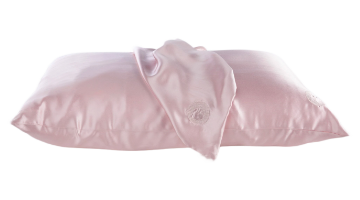How to Sleep Better with Acid Reflux
Last Updated on April 11, 2025
by Marc Werner, Founder - GhostBed
Feeling the burn? If you experience frequent heartburn or other common acid reflux symptoms as you lay down to sleep, you’re not alone. It’s normal for acid reflux to flare up right when you’re ready to hit the sheets.
Fortunately, a few tweaks to the way you’re sleeping can help reduce and relieve symptoms.

What is Acid Reflux?
Acid reflux, GERD and heartburn are often used interchangeably, but it’s important to understand the differences.
Acid reflux refers to when stomach acid backs up into your esophagus, lungs, throat or sinuses—places where it definitely doesn’t belong. Acid reflux can cause many different symptoms, one of which is heartburn, a burning sensation in the upper abdomen or chest. An estimated 60 million Americans experience heartburn at least once per month. Other symptoms include a sour or bitter taste in the mouth or back of the throat, sore throat, cough, chest pressure and difficulty swallowing.
You might be diagnosed with gastroesophageal reflux disease (GERD) when acid reflux becomes more frequent, such as more than two times per week. GERD is a chronic condition that affects 15-30% of the US population.
What Causes Acid Reflux?
To understand what causes acid reflux, we first need to understand how digestion works.
Here’s an overview from WebMD:
Normally after you eat something, the food moves down into your stomach via your throat and esophagus. A specific muscle, the lower esophageal sphincter (LES), controls the opening between your esophagus and your stomach during this process.
Reflux occurs if your LES is too weak or relaxed to close properly after this happens, allowing stomach acid to back up into your esophagus. Stomach acid is normal and is there to break down food and protect you from dangerous bacteria—but it belongs in your stomach and nowhere else. That burning sensation you feel is the acid hitting the lower part of your esophagus, which isn’t built to handle such a strong acid. Ouch!
So, what exactly causes this to happen? Certain conditions, including obesity and connective tissue disorders, can increase your risk. But simple lifestyle choices can also aggravate acid reflux. These include:
- Eating certain trigger foods
- Drinking certain trigger beverages
- Eating large meals
- Lying down shortly after eating a meal
If you’ve ever eaten a large snack right before bed, you might know the feeling. Many people experience the strongest acid reflux symptoms at night, and we’ll get into the reasons why next.
How Do Acid Reflux and GERD Affect Sleep?
So, why is acid reflux worse at night, right as you’re drifting off to sleep? According to the Cleveland Clinic, you can blame gravity for this one.
When you’re sitting upright or standing, gravity helps move food efficiently through your esophagus. But when you’re lying down, you lose that helpful force. You also swallow less when you’re sleeping, further reducing the normal digestive functions that keep acid reflux at bay.
Heartburn pain caused by acid reflux and GERD may also wake you up in the middle of the night. Stomach acid can travel as far as your throat, causing you to wake up in a coughing fit. The acid can also result in a sickly-tasting regurgitation in your mouth.
Finally, battling acid reflux at night can lead to more serious problems if your stomach acid pools around your vocal cords and sinuses. This is known as laryngopharyngeal reflux (LPR), and symptoms include hoarseness, noisy breathing and a chronic cough. GERD also increases your risk of sleep apnea, which is when you repeatedly stop and start breathing during the night.
How an Adjustable Bed Helps with Acid Reflux
As you can see, sleep can be elusive when you’re dealing with acid reflux. Churning stomach acids don’t exactly feel relaxing!
Fortunately, an adjustable bed base can help reduce your symptoms by allowing you to elevate the head of your bed. With gravity working in your favor, your stomach acids will stay put instead of traveling up into your esophagus.
When your body is slightly elevated, gravity is also working in your favor to help with digestion, further reducing gastric symptoms.
If you’re someone who experiences coughing when you have acid reflux, an adjustable base can be beneficial for that too. Sleeping at a slight elevation can help to open your airways and promote better breathing.
Finally, sleeping at an incline puts less pressure on the LES. This is important because pressure on this muscle, which occurs when you lie flat, can potentially weaken it–causing acid to flow upward.
How to Elevate Your Head for Acid Reflux
Try using your adjustable base to position yourself on an incline with your head elevated 6 to 8 inches above the lower body. A lot of our customers also love the zero gravity position, which is a great way to relieve pressure off your back and keep your acid reflux or GERD under control.
Also: if you’re a side sleeper, WebMD recommends sleeping on your left side, which is known to help with heartburn.
Learn From the GhostBed Sleep Experts
To learn more about how an adjustable base can help make sleeping easier with acid reflux, watch the short video below! In it, we share our top tips to use gravity to your advantage as you sleep.
Better Sleep with an Adjustable Bed
Ready to shop for an adjustable bed? The GhostBed Adjustable Base can help you sleep better with acid reflux thanks to nearly infinite elevation options. Customize your bed to the perfect position and you’ll be on your way to better health and sleep.

Marc has spent the last two decades designing & manufacturing mattresses and other sleep products, drawing on a lifetime of experience working with the material sciences. With several patents to his name, he works closely with the GhostBed team to create products with the perfect balance of comfort & support. Learn More




